UAE bans waterpipes, creates national awareness and adapts smoking cessation services during COVID-19
Introduction
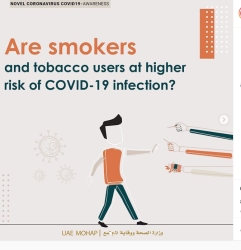 UAE’s Ministry of Health and Prevention is focusing on three main areas within tobacco control during the COVID-19 pandemic: enforcing a ban on waterpipe use in public places, a national awareness campaign and adapting smoking cessation services.
UAE’s Ministry of Health and Prevention is focusing on three main areas within tobacco control during the COVID-19 pandemic: enforcing a ban on waterpipe use in public places, a national awareness campaign and adapting smoking cessation services.
Ban on waterpipes in public places
On 12 March 2020, municipalities of different Emirates had issued a decision banning waterpipes in all restaurants and cafés. The decision was published in official newspapers and disseminated widely across social media platforms. This ban was monitored by economic development and municipalities affairs authorities. The response to the ban was mostly positive and restaurants and cafés immediately removed waterpipes. Where there were violations, they were met with fines and closures as needed. Using waterpipes in the privacy of homes and especially by youth still poses a challenge.
Awareness campaign during COVID-19
UAE’s Ministry of Health and Prevention, during the second week of March 2020, launched a wide-scale awareness campaign using its social media platforms. The reach figures during the period 17 April to 4 June include: 206 954 for Facebook posts and 299 118 for Instagram posts. During the same period, the engagement figure on Twitter reached 33 070.
To coincide with World No Tobacco Day 2020, a press statement by His Excellency the Undersecretary of Health was circulated widely. The statement stressed on the linkages between tobacco use and the transmission of the COVID-19 virus. The statement urged smokers to quit in order to reduce the risk of contracting the virus and to increase the recovery chances from COVID-19.
Adapting smoking cessation services
UAE’s Ministry of Health and Prevention shifted its smoking cessation services to virtual primary healthcare e-clinics during the pandemic. The physicians were able to carry out consultations and counselling for patients through the use of video communication and collaboration platforms.
Way forward
Currently, all lockdown restrictions have been lifted across UAE. The Ministry of Health and Prevention is developing a mass media campaign on tobacco control. The campaign will be launched by the end of 2020. Future plans will also include the integration of smoking cessation services in all primary healthcare clinics through an online training program that aims to enable all physicians to provide smoking cessation services and training of dentists to provide basic smoking cessation advice to patients.
Related links
Coronavirus: Dubai bans shisha pipes with immediate effect (The National)
No Tobacco Day: UAE Ministry warns smokers about COVID-19 risks (Khaleej Times)
UAE Health Ministry urges smokers to kick habit to mark 'World No Tobacco Day' (Gulf Today)
UAE’s Ministry of Health and Prevention post in Arabic on noncommunicable diseases and COVID-19
Waterpipe use banned in Dubai, Ajman, Fujairah and Ras Al Khaimah (Al Bayan)
Iraq bans waterpipes, creates awareness and combats illicit trade in tobacco products
Introduction
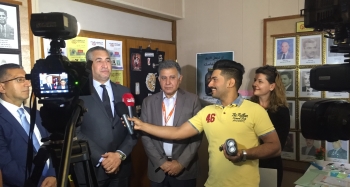 Iraq’s Government has set up a multisectoral Crisis Committee in response to the COVID-19 pandemic. The Crisis Committee is formed from a number of ministries which collaborate closely to curb the pandemic. Iraq’s Ministry of Health is ramping up health awareness activities during this critical period. The Higher Committee for Anti-smoking at the Ministry of Health has developed an emergency plan, based on the MPOWER package, introducing activities for tobacco control in light of the current restrictions. The Higher Committee is focusing on three main areas within tobacco control: enforcing a ban on use of waterpipes in public places, creating awareness through campaigns, and combating illicit trade in tobacco products.
Iraq’s Government has set up a multisectoral Crisis Committee in response to the COVID-19 pandemic. The Crisis Committee is formed from a number of ministries which collaborate closely to curb the pandemic. Iraq’s Ministry of Health is ramping up health awareness activities during this critical period. The Higher Committee for Anti-smoking at the Ministry of Health has developed an emergency plan, based on the MPOWER package, introducing activities for tobacco control in light of the current restrictions. The Higher Committee is focusing on three main areas within tobacco control: enforcing a ban on use of waterpipes in public places, creating awareness through campaigns, and combating illicit trade in tobacco products.
Ban on waterpipes in public places
At the onset of the COVID-19 pandemic, in the first week of March, one of the first decisions of the Crisis Committee was to close down coffee shops, cafés and restaurants. This decision directly impacted on the use of waterpipes. The decision came in light of the current health conditions as well as in line with measures to prevent infection with COVID-19 especially in venues where people gather in large numbers. Security forces ensured that coffee shops, cafés and restaurants were closed, with restaurants providing delivery services only.
In conjunction with these efforts, security forces have clamped down on youth who are using waterpipes in public gatherings. The forces have dealt with the violators according to the Iraqi law of 2012 which prohibits the use of tobacco products in all forms including waterpipes in public places.
Awareness campaigns during COVID-19
Iraq’s Ministry of Health disseminated widely to the Baghdad Health Department and other health departments a publication by the World Health Organization (WHO) showing the link between tobacco use and the transmission of the virus and the severity of the disease that causes COVID-19. In turn, health departments in Baghdad and all Iraqi governorates printed materials, based on the WHO publication, to raise awareness to the public. They complemented this with field visits to markets and venues of gatherings as well as individual visits to raise awareness about COVID-19 prevention, protection and risk factors including smoking and use of tobacco products.
Iraq’s health radio and other international media like ‘Sawa’ radio hosted tobacco combat programme officials through interviews to raise awareness about smoking and COVID-19, within that the use of waterpipes was highlighted as a key risk factor.
Iraq’s Ministry of Health, in collaboration with WHO, celebrated World No Tobacco Day 2020 with a webinar using videoconferencing. The virtual celebration was titled “Protecting youth from tobacco companies’ tricks and preventing them from smoking”. The webinar, held on 30 June 2020, was attended by WHO experts and representatives from the ministries of health, education, electricity, petroleum, interior, finance (customs authority), planning and trade, youth and sports, communications, agriculture, water resources, higher education and scientific research, culture and tourism, in addition to a number of senior officials from various governmental bodies.
Combating illicit trade in tobacco products
Iraq is Party to the Protocol to Eliminate Illicit Trade in Tobacco Products since 2015. Iraq’s Ministry of Health, in collaboration with the Council of State, has established a committee to form a Central Authority to follow-up the implementation of the Protocol and to provide the legal support needed for its implementation. It is expected that the Authority will be formed from representatives of the General Secretariat of the Council of Ministers in addition to representatives from the Council of State and the following ministries: health, interior, finance (customs authority), planning and trade. The role of the Authority will be key to support authorities which are combating illicit trade such as the General Customs Authority which has seized a number of illicit trade products recently.
The Council of State has been a partner in drafting the new tobacco law— drafted in line with the MPOWER strategy and the Protocol to Eliminate Illicit Trade in Tobacco Products— in preparation to passing it onto the Iraqi Parliament.
Way forward
Iraq’s Ministry of Health Heads of Departments met using video conferencing to develop a plan to relax lockdown restrictions after Eid El-Adha. Part of this plan will cover tobacco control activities. It is expected that coffee shops, cafés and restaurants will continue to be closed even when lockdown restrictions are relaxed in future.
Iraq’s Ministry of Health Tobacco Combat Division is looking to continue its awareness campaigns and is searching for a young influencer or celebrity to participate in these campaigns.
Iraq is looking forward to having guidelines for Protocol implementation and to collaborating with its neighboring countries to enact the Protocol to Eliminate Illicit Trade in Tobacco Products through bi-lateral agreements. It is also looking forward to building on WHO’s technical and practical experiences with countries in implementing the Protocol. In addition, the Central Authority for Specifications and Quality Control is looking to introduce some changes to the Iraqi standard specifications for tobacco products. The changes, such as ensuring that the importer includes data on the country of origin, will help trace tobacco products more effectively.
Related links
General Customs Authority seizes a number of illicit trade products recently (Facebook post)
General Customs Authority seizes a number of illicit trade products recently (Facebook video)
Iraq’s health radio highlights the negative effects of smoking (Facebook)
Kuwait bans waterpipes and creates national awareness during COVID-19
Introduction
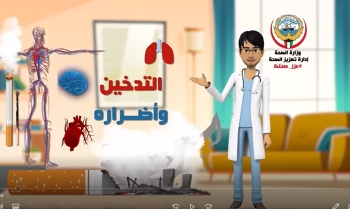 Kuwait’s Ministry of Health ramped up health awareness activities including tobacco control, in response to the COVID-19 pandemic. The Ministry launched, on 31 March 2020, a national campaign to raise awareness of COVID-19 risks and protection measures. Kuwait’s Ministry of Health is focusing on two main areas in tobacco control: enforcing a ban on waterpipe use in public places and a national awareness campaign. The Ministry is collaborating closely with several ministries and sectors to facilitate these efforts, whilst considering the challenges posed by most staff working remotely which prolongs the time for interaction and activities.
Kuwait’s Ministry of Health ramped up health awareness activities including tobacco control, in response to the COVID-19 pandemic. The Ministry launched, on 31 March 2020, a national campaign to raise awareness of COVID-19 risks and protection measures. Kuwait’s Ministry of Health is focusing on two main areas in tobacco control: enforcing a ban on waterpipe use in public places and a national awareness campaign. The Ministry is collaborating closely with several ministries and sectors to facilitate these efforts, whilst considering the challenges posed by most staff working remotely which prolongs the time for interaction and activities.
Ban on waterpipes in public places
The Kuwait National Assembly held an exceptional session and amended Article (17) of Law 8/1969 on health precautions to prevent communicable diseases. The modifications included closing all places and shops that could be a potential source of infection and increasing the severity of penalties in cases of violations. The Department of Legal Affairs in the Ministry of Health is working closely with the Ministry of Interior to implement these amendments. Kuwait’s Ministry of Health recommended the closure of all places selling or using waterpipes. The Municipality of Kuwait fully enforced this recommendation by closely communicating with Municipality Managers and conducting regular inspections. Violations were met with a few penalties depending on the extent of the violation. Penalties ranged from fines (5000 up to 30 000 Kuwaiti Dinars), confiscation of waterpipes to imprisonment (3 months up to 10 years). However, using waterpipes in the privacy of homes and especially by youth still poses a challenge.
The existing ban during COVID-19 has demonstrated its feasibility given the close collaboration of the different ministries and government bodies. Dr Amaal Al-Yehia, Rapporteur of the Ministry of Health National Anti-smoking Programme, stated: “We successfully implemented the ban so would like to use this in future as evidence of what can be achieved”.
Recognition of World No Tobacco Day and linking its activities to COVID-19
The National Anti-smoking Programme launched a national awareness campaign to coincide with World No Tobacco Day 2020. The campaign focused on showing the link between tobacco use and the transmission of the virus and the severity of the disease that causes COVID-19. The campaign stressed on the importance of controlling tobacco use and banning the use of waterpipes at this critical time.
The campaign consisted of videos, a speech and press engagement. Two videos were disseminated through mass media and various social media platforms (Twitter, Instagram and YouTube). The speech by the Head of the National Anti-smoking Programme was broadcast on national television and its official channels. Key television programmes hosted National Anti-smoking Programme officials through interviews to advocate tobacco cessation and the ban on the use of waterpipes. Kuwait’s Ministry of Health holds a daily press conference to update the public on developments of the pandemic. His Excellency the Minister of Health and official spokespeople use the press conference as a platform to disseminate key messages, including the accumulating evidence which links smoking and increasing severity of COVID-19.
Way forward
The Government of Kuwait has developed a country-wide transition plan outlining the eventual return to normal activities, subject to the COVID-19 situation across the country. The plan consists of five phases, each lasting three weeks. The first phase started on 31 May 2020. At the end of each phase, the COVID-19 situation will be reviewed and assessed. Transition to the next phase will depend on the recommendation of the Ministry of Health based on rates of virus control.
Future plans are in place to continue the ban on tobacco use in public places especially waterpipes after the transitional phases. Kuwait’s Ministry of Health plans to run ongoing awareness campaigns throughout the year and beyond the transitional phases.
To feed into future studies showing the link between smoking and COVID-19, Kuwait’s Ministry of Health recommended that for all diagnosed or suspected COVID-19 patients, smoking history should be always completed as part of taking their medical history.
The National Anti-smoking Programme will continue to collaborate closely with the World Health Organization and plan a joint event in the near future. The Programme has started to work with the Ministry of Industry to regulate the Electronic Nicotine Delivery Systems by developing a legislation for a Kuwaiti Standard Specification.
Related links
The implementation stage of the amendments to the health law starts (Aljarida)
Bahrain bans waterpipes and creates national awareness during COVID-19
Introduction
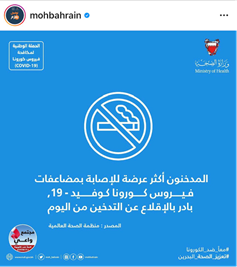 The Government of Bahrain set up the Executive Committee headed by His Royal Highness Prince Salman bin Hamad Al Khalifa, the Crown Prince, Deputy Supreme Commander and First Deputy Prime Minister in response to the COVID-19 pandemic. The Committee monitors and places measures to prevent the spread of COVID-19. In addition, a National Taskforce for Combating the Coronavirus (COVID-19) has been set up. Tobacco control activities during this critical time include a ban on waterpipe use in public places and a national awareness campaign.
The Government of Bahrain set up the Executive Committee headed by His Royal Highness Prince Salman bin Hamad Al Khalifa, the Crown Prince, Deputy Supreme Commander and First Deputy Prime Minister in response to the COVID-19 pandemic. The Committee monitors and places measures to prevent the spread of COVID-19. In addition, a National Taskforce for Combating the Coronavirus (COVID-19) has been set up. Tobacco control activities during this critical time include a ban on waterpipe use in public places and a national awareness campaign.
Ban on waterpipes in public places
The Executive Committee issued a decision, on 17 March 2020, closing all restaurants and cafés serving waterpipes for one month. Bahrain’s Ministry of Health inspectors are ensuring that the ban is enforced, and violations are reported. The ban on waterpipes will remain in effect until further notice, however, cafes and restaurants are lobbying for the use of disposable waterpipes outdoors.
The Minister of Trade issued a decision, on 23 April 2020, to ban delivery of all tobacco products including waterpipes. The decision was issued to combat cafés which were continuing to deliver waterpipes to homes. This decision was supported by a number of penalties such as closing down the cafés and imposing hefty fines for violators. In an incident published in newspapers, a café was violating the ban and its owners were fined 9000 Bahraini Dinars (around USD 25 000) in addition to an initial bail amounting to 2000 Bahraini Dinars (around USD 5000). These fines were deliberately high to set an example to other cafés. Currently, a trial is underway for the owners of another café because it was operating secretly, in addition to imposing a hefty fine.
The close collaboration between the ministries of health, interior and trade continues to enforce the anti-tobacco and general health laws in spite of most of the efforts currently being dedicated to COVID-19. Recently, the Ministry of Trade has been granted judicial powers similar to those held by the ministries of health and interior to enforce the laws.
Awareness campaigns during COVID-19
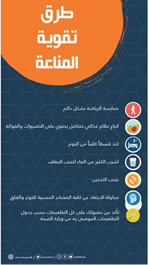 Bahrain’s Ministry of Health launched a campaign based on posters showing the link between tobacco use and the transmission of the virus that causes COVID-19. To coincide with World No Tobacco Day 2020, Her Excellency the Minister of Health put out a statement on tobacco use as one of the risk factors for COVID-19.
Bahrain’s Ministry of Health launched a campaign based on posters showing the link between tobacco use and the transmission of the virus that causes COVID-19. To coincide with World No Tobacco Day 2020, Her Excellency the Minister of Health put out a statement on tobacco use as one of the risk factors for COVID-19.
Way forward
Current efforts are paving the way to be able to extend the ban on waterpipes beyond the COVID-19 pandemic. Dr. Ejlal AlAlawi, Head of Anti-Smoking Group at the Public Health Directorate and Focal Point of Tobacco Control at the Bahrain Ministry of Health stated: “I expect that cafés which serve waterpipes will not go back to their activities easily”.
Related links
A café fined 9000 Bahraini Dinars for violating the ban
Bahrain’s Government Executive Committee introduces additional COVID-19 precautionary measures








